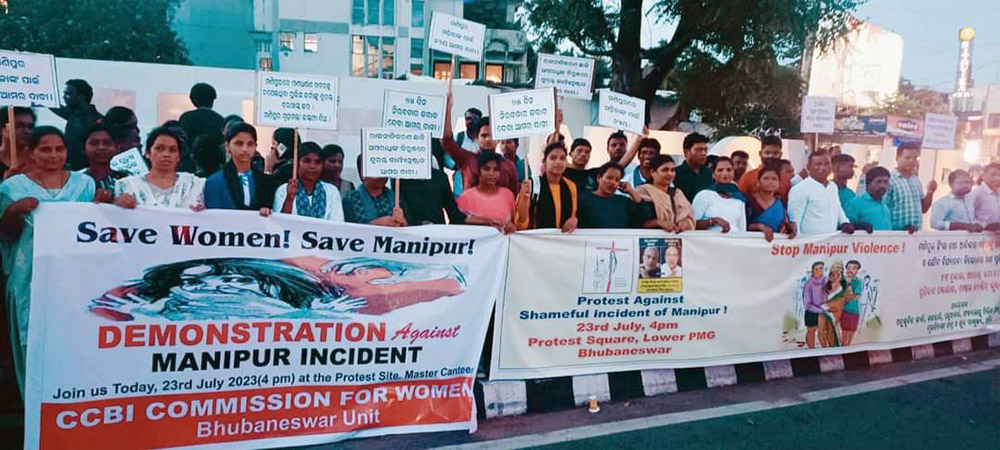
Sacred Hearts of Jesus and Mary Sr. Sujata Jena joins women and civil society groups in a demonstration against the Manipur incident on May 23 in Bhubaneswar, Odisha. (Courtesy of Sujata Jena)
India shook the world once more with another shameful incident in Manipur. Manipur is one of the seven northeastern states of India. On May 3, an ethnic conflict erupted between the majority Meitei people, who dwell in the valleys of Manipur, and the Kuki-Zomi tribal community dwelling in the hills.
The violence unfolded in response to the order of the High Court of Manipur's recommendation granting scheduled tribe status to the Meitei community. Instantly, it turned into an ethnoreligious pogrom.
According to The Wire, the Meitei make up 53% of the state's population, while the Kuki and 33 other tribes make up 30%. Meitei people are predominantly Hindu and live in the valleys of the state capital, while Kuki people are primarily Christian and live in the surrounding hills.
As of July 29 reports, 181 people had been killed as a result of the violence. More than 300 were wounded, approximately 54,488 were displaced, and around 400 churches were destroyed.
According to The Guardian, a video went viral on July 19 portraying two women being forcibly stripped, paraded naked, publicly molested, and allegedly gang-raped. The police officers remained as mere onlookers seated in the car witnessing the violence, a woman being gang-raped, and her 19-year-old brother and father killed as they tried to protect her from the mob.
The police did not protect the victims from being assaulted and raped, nor did they prevent the killings by the mob. The incident occurred on May 4, a day after violence broke out in Manipur.
The video sparked outrage in India, prompting civil society and church groups to organize protests in various towns and cities. The Supreme Court, "deeply disturbed" by the Manipur video, urged swift action against perpetrators for the heinous act of molesting women.
According to the Mint, an online news portal, "The United States has reacted to the video of a brutal attack on two women in Manipur and supported the Indian Government's efforts to seek justice for them. A senior Biden administration official said that the US is 'shocked and horrified' by the visuals of the attack."
Horrified and disturbed by the horrendous violence, the Conference of Catholic Bishops in India's Commission for Women conducted peace rallies in almost 132 dioceses of the Latin church in India. I was requested to organize a peaceful demonstration against the incident in the capital city of Bhubaneswar in the eastern Indian State of Odisha on behalf of the women in the Cuttack-Bhubaneswar Archdiocese.
Advertisement
I was shocked to learn that Meira Paibis, a vigilante group of Meitei women, handed over an 18-year-old Kuki woman to four armed young men to be gang-raped. Who are the Meira Paibis?
Meira Paibis (women torch bearers) are a social movement in Manipur. Also known as Imas or Mothers of Manipur, the activists are Meitei women from all sections of society in the Imphal valley, according to The Indian Express, which said they "are widely respected, and represent a powerful moral force."
Such barbaric acts could not have happened without the support of the ruling powers (the government). Yet, it pains me that a group of women who represent a moral force in advocating for human rights and justice reportedly participated in such a heinous crime.
Empowerment is recognizing one's inner power and bringing out the best in oneself for our well-being and that of others. Empowerment is not about using our power to oppress others.
The actual perpetrator of violence is to be condemned. However, women handing over a woman to be molested, raped and killed to the extent of depravity need to be categorized separately. It needs to be condemned at the highest level.
Shockingly, the honorable president of India, the constitutional head of the country and a woman from a tribal community has maintained deafening silence to date. The prime minister of India spoke only after the Supreme Court ordered the government to report its actions.
For such a scale of violence, even one day of silence on the part of the government is too long. Many lives could have been saved if the administration was willing to settle the matter. It shows that its priorities are misplaced.
A woman is an embodiment of true love, life and sacrifice. As co-creators, women should nourish and sustain human life, not destroy it. A woman needs to realize the God-given giftedness and goodness within. Could women ignore this incredible role in the divine plan of God?
I recall the words of Jesus in the Sermon on the Mount: "Beware of false prophets, which come to you in sheep's clothing, but inwardly they are ravening wolves" (Matthew 7:15). They must have been relevant words at the time of Jesus. They are still relevant today.
Sadly, we see ourselves as prophets but behave like wolves in sheep's clothing. On the outside, we seem to possess the attitudes of love, kindness and gentleness, yet our attitudes, behaviors and actions contradict us many times.
It is possible for things to go wrong in our religious communities when we don't reflect on and live out the charism and principles that form the foundation of our lives, vocations, missions and roles. Community life will only flourish if we prioritize caring for, supporting, dialoguing with, and nurturing each other. These core values in religious life are essential for building a strong community.
If we can't love, support, protect, promote or build up, then at least we must refrain from toxic hatred, discouragements and harmful obstructions that destroy one's own life and that of the community.
The hallmark of a genuinely good religious person is integrity and transparency. These are precious qualities rarely found today and are a challenge to all of us. Jesus invites us to be genuine and a "persona Christi."





